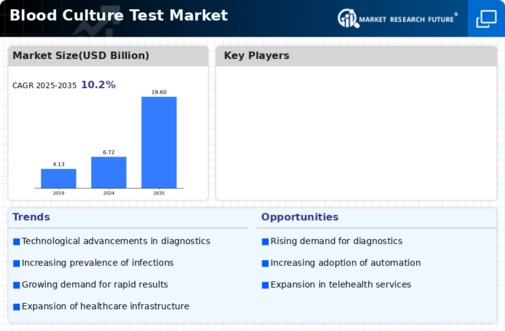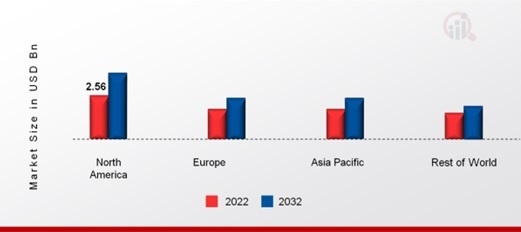Technological advancements in Blood Culture Testing are driving the market growth.
The Blood Culture Test market showcases a significant focus on technological advancements. Continuous innovation in Blood Culture Testing methods, including the incorporation of advanced automation, molecular techniques, and rapid diagnostic technologies, has enhanced the efficiency and accuracy of detecting infectious agents in blood samples. These advancements not only contribute to faster and more reliable results but also support healthcare professionals in making informed decisions regarding patient treatment plans, leading to improved outcomes and reduced healthcare costs. This factor drives the Market CAGR.
Additionally, a notable trend in the Blood Culture Test market is the growing demand for point-of-care testing solutions. Point-of-care Blood Culture Testing allows for rapid diagnosis at or near the patient's location, reducing the turnaround time for results. This trend is particularly beneficial in emergency departments, critical care settings, and ambulatory care, where quick and accurate detection of bloodstream infections is crucial. The shift towards point-of-care testing aligns with the broader healthcare trend of decentralizing diagnostics and improving accessibility to timely and actionable information for healthcare providers.
Molecular diagnostic techniques play a key role in shaping the trends in the Blood Culture Test market. The increasing adoption of molecular methods, such as polymerase chain reaction (PCR) and nucleic acid amplification, allows for the rapid identification of specific pathogens and their resistance patterns. This molecular-level precision contributes to effective antibiotic stewardship by enabling healthcare professionals to tailor antimicrobial therapy to the specific characteristics of the detected pathogens. With the rising global concern over antibiotic resistance, these trends reflect a strategic approach toward optimizing treatment strategies and preserving the effectiveness of available antimicrobial agents.
For instance, in October 2022, the NRH Medical Lab received a state-of-the-art blood culture machine worth USD 43,740 from the Australia High Commission. Thus, driving the Blood Culture Test market revenue.
Blood Culture Test Market Segment Insights
Blood Culture Test Method Insights
The Blood Culture Test market segmentation, based on Method, includes Conventional and automated. The dominating method category is automated, holding a significant market share due to the efficiency, accuracy, and faster turnaround time offered by automated blood culture systems. Conversely, the fastest-growing method category is conventional, which is experiencing rapid expansion as there is a renewed focus on enhancing traditional blood culture techniques.
Blood Culture Test Product Insights
The Blood Culture Test market segmentation, based on Product, includes Consumables and instruments. The dominating product category is consumables, which hold a significant market share due to the consistent demand for consumable items like culture media, blood culture bottles, and other disposable components essential for conducting accurate Blood Culture Tests. Conversely, the fastest-growing product category is Instruments, which is experiencing rapid expansion as technological advancements drive innovation in Blood Culture Testing equipment.
Blood Culture Test Technology Insights
The Blood Culture Test market segmentation, based on Technology, includes Culture, Molecular, and Proteomics. The dominating technology category is culture, which holds a significant market share due to its longstanding use and reliability in identifying microbial pathogens through traditional culturing methods. Conversely, the fastest-growing technology category is Molecular, experiencing rapid expansion as advancements in molecular diagnostic techniques, such as polymerase chain reaction (PCR) and nucleic acid amplification, provide faster and more accurate detection of pathogens.
Blood Culture Test Application Insights
The Blood Culture Test market segmentation, based on Technology, includes Culture, Molecular, and Proteomics. The dominating application category is bacteremia, which holds a significant market share due to the widespread prevalence of bacterial infections and the routine use of blood cultures for diagnosing bacterial bloodstream infections. Conversely, the fastest-growing application category is fungemia, which is experiencing rapid expansion as the recognition of fungal infections and the demand for accurate fungal pathogen identification continue to rise.
Blood Culture Test End User Insights
The Blood Culture Test market segmentation, based on End Users, includes Hospitals and reference Labs. The dominating end-user category is hospitals, which hold a significant market share due to the high volume of Blood Culture Tests conducted within hospital settings for diagnosing various infections. Conversely, the fastest-growing end-user category is Reference Labs, which is experiencing rapid expansion as there is a growing trend toward outsourcing specialized and high-complexity testing services.
Blood Culture Test Regional Insights
By region, the study provides the market insights into North America, Europe, Asia-Pacific, and the Rest of the World. The North American Blood Culture Test market area will dominate this market, owing to advanced healthcare infrastructure and a high level of awareness among healthcare professionals, which will boost market growth in this region.
Further, the major countries studied in the market report are the US, Canada, Germany, France, the UK, Italy, Spain, China, Japan, India, Australia, South Korea, and Brazil.
Europe's Blood Culture Test market accounts for the second-largest market share due to the healthcare system and a proactive approach to infectious disease management. Further, the German Blood Culture Test market held the largest market share, and the UK Blood Culture Test market was the fastest-growing market in the European region.
The Asia-Pacific Blood Culture Test Market is expected to grow at the fastest CAGR from 2023 to 2032. This is due to rapid urbanization, population growth, and increasing healthcare awareness. Moreover, China’s Blood Culture Test market held the largest market share, and the Indian Blood Culture Test market was the fastest-growing market in the Asia-Pacific region.
Blood Culture Test Key Market Players& Competitive Insights
Leading market players are investing heavily in research and development in order to expand their product lines, which will help the Blood Culture Test market grow even more. Market participants are also undertaking a variety of strategic activities to expand their global footprint, with important market developments including new product launches, contractual agreements, mergers and acquisitions, higher investments, and collaboration with other organizations. To expand and survive in a more competitive and rising market climate, the Blood Culture Test industry must offer cost-effective items.
Manufacturing locally to minimize operational costs is one of the key business tactics used by manufacturers in the Blood Culture Test industry to benefit clients and increase the market sector. In recent years, the Blood Culture Test industry has offered some of the most significant advantages. Major players in the Blood Culture Test market include BD (U.S.), Abbott Laboratories (U.S.), F. Hoffmann-La Roche Ltd (Switzerland), Novartis AG (Switzerland), Eli Lilly and Company (U.S.), Terumo Corporation (Japan), Bruker Corporation (U.S.), bioMérieux SA (France), Bayer AG (Germany), and Merck & Co., Inc. (U.S.).
T2 Biosystems, Inc. is a company specializing in the development of innovative diagnostic products aimed at improving patient outcomes through rapid and accurate detection of various diseases. Founded in 2006 and headquartered in Lexington, Massachusetts, T2 Biosystems focuses on creating diagnostic solutions that leverage its proprietary T2MR technology, enabling direct detection of pathogens and other biomarkers in whole blood. The company's portfolio includes diagnostics for sepsis, hemostasis, and Lyme disease. In March 2023, T2 Biosystems, Inc. announced its plan to add Candida Auris detection technology to its existing T2Candida panel.
The company has already received FDA and CE approval for its T2Candida panel.
Bruker Corporation is a leading global provider of scientific instruments and solutions for a variety of industries, including life sciences, analytical chemistry, diagnostics, and materials research. Founded in 1960 and headquartered in Billerica, Massachusetts, Bruker is known for its innovative technologies that enable advancements in areas such as structural and molecular biology, mass spectrometry, magnetic resonance, and X-ray analysis. In April 2023, Bruker Corporation introduced MALDI Biotyper IVD Software. The new software provides a high sample throughput for microbial identification. The software is used in a variety of clinical settings, including hospitals, clinics, and reference laboratories.
Key Companies in the Blood Culture Test market include
BD (U.S.)
Abbott Laboratories (U.S.)
F. Hoffmann-La Roche Ltd (Switzerland)
Novartis AG (Switzerland)
Eli Lilly and Company (U.S.)
Terumo Corporation (Japan)
Bruker Corporation (U.S.)
bioMérieux SA (France)
Bayer AG (Germany)
Merck & Co., Inc. (U.S.)
Blood Culture Test Market Industry Developments
Q2 2024: bioMérieux launches BACT/ALERT® VIRTUO® 2.0, the next generation of its automated blood culture system bioMérieux announced the launch of BACT/ALERT® VIRTUO® 2.0, an upgraded automated blood culture system designed to improve workflow efficiency and detection speed for bloodstream infections.
Q2 2024: BD Receives FDA Clearance for BD BACTEC™ FX40 Blood Culture System BD announced it received FDA clearance for its BD BACTEC™ FX40 Blood Culture System, a compact instrument aimed at smaller laboratories to help detect bloodstream infections.
Q2 2024: Thermo Fisher Scientific Launches New Oxoid™ Blood Culture Media for Rapid Pathogen Detection Thermo Fisher Scientific introduced a new line of Oxoid™ blood culture media, designed to enhance the speed and accuracy of pathogen detection in clinical laboratories.
Q3 2024: bioMérieux and Illumina Announce Strategic Partnership to Advance Next-Generation Sequencing for Infectious Disease Diagnostics bioMérieux and Illumina entered a strategic partnership to integrate next-generation sequencing technologies into infectious disease diagnostics, including applications in blood culture testing.
Q3 2024: Accelerate Diagnostics Appoints Jack Phillips as Chief Executive Officer Accelerate Diagnostics announced the appointment of Jack Phillips as its new CEO, aiming to drive growth in its rapid blood culture diagnostics business.
Q3 2024: Luminex Receives CE Mark for VERIGENE® II Blood Culture Assay Luminex Corporation received CE Mark approval for its VERIGENE® II Blood Culture Assay, enabling commercialization in the European market.
Q4 2024: Roche Launches cobas® Blood Culture Test in Europe Roche announced the European launch of its cobas® Blood Culture Test, designed to provide rapid identification of bloodstream infections.
Q4 2024: Seegene and Hamilton Announce Collaboration to Automate Blood Culture Diagnostics Seegene and Hamilton formed a collaboration to automate blood culture diagnostics, aiming to improve laboratory efficiency and turnaround times.
Q1 2025: QIAGEN Launches QIAstat-Dx Blood Culture Identification Panel in the U.S. QIAGEN launched its QIAstat-Dx Blood Culture Identification Panel in the United States, expanding its syndromic testing portfolio for rapid pathogen identification.
Q1 2025: bioMérieux Opens New Manufacturing Facility for Blood Culture Bottles in France bioMérieux inaugurated a new manufacturing facility in France dedicated to producing blood culture bottles, increasing its production capacity to meet global demand.
Q2 2025: Accelerate Diagnostics Announces $35 Million Private Placement Financing Accelerate Diagnostics raised $35 million in a private placement financing round to support the commercialization of its rapid blood culture diagnostic solutions.
Q2 2025: BD and Siemens Healthineers Announce Global Partnership to Advance Blood Culture Diagnostics BD and Siemens Healthineers announced a global partnership to co-develop and market advanced blood culture diagnostic solutions for clinical laboratories.
Blood Culture Test Market Segmentation
Blood Culture Test Method Outlook
Conventional
Automated
Blood Culture Test Product Outlook
Consumables
Instruments
Blood Culture Test Technology Outlook
Culture
Molecular
Proteomics
Blood Culture Test Application Outlook
Bacteremia
Fungemia
Blood Culture Test End User Outlook
Hospitals
Reference Labs
Blood Culture Test Regional Outlook
North AmericaUS
Canada
EuropeGermany
France
UK
Italy
Spain
Rest of Europe
Asia-PacificChina
Japan
India
Australia
South Korea
Australia
Rest of Asia-Pacific
Rest of the WorldMiddle East
Africa
Latin America
.webp












Leave a Comment